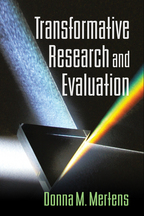Transformative Research and Evaluation
Donna M. Mertens
The Intersection of Applied Social Research and Program Evaluation
Paradigms
Rationale for the Transformative Paradigm
Breadth of Transformative Paradigm Applicability
1. Resilience, Resistance, and Complexities That Challenge
In This Chapter
Human Rights Agenda
The Transformative Paradigm as a Metaphysical Umbrella
Need for Transformative Research and Evaluation
Examples of Transformative Research and Evaluation
Examples of Shifting Paradigms
Need for the Transformative Paradigm and Scholarly Literature
Need for the Transformative Paradigm and Public Policy
Complexities That Challenge
Ethical Impetus
Striving for Improved Validity
Summary
2. The Transformative Paradigm: Basic Beliefs and Commensurate Theories
In This Chapter
Paradigms and Basic Belief Systems
The Transformative Paradigm and Its Basic Belief Systems
Theories Commensurate with the Transformative Paradigm
Politics and Power
Summary
3. Self, Partnerships, and Relationships
In This Chapter
Human Relations as Factors Contributing to Research Validity and Rigor
Knowing Yourself
Knowing Yourself in Relation to the Community
Cultural Competence
Strategies for Developing Relationships/Partnerships
Types of Partnerships/Relationships
Challenges in Relationships/Partnerships
Recognizing the Complexity of Culturally Competent Work
Purposes of Partnerships
Examples of Points of Interaction in the Research Process
Building Capacity
Summary
4. Developing the Focus of Research/Evaluation Studies
In This Chapter
Purposes for the Gathering of Information at This Stage of the Inquiry
Sources That Support the Need for Research and Evaluation
Theoretical Frameworks
Making Use of Sources
Summary
5. A Transformative Research and Evaluation Model
In This Chapter
Cyclical Models: Indigenous Peoples
Cyclical Model: PAR
Cyclical Models: Immigrant Communities
Short-Term Research and Evaluation
Types of Transformative Research and Evaluation
Transformative Intervention Approaches
Summary
6. Quantitative, Qualitative, and Mixed Methods
In This Chapter
Mixed- and Multiple-Methods Approaches
Case Studies
Ethnography
Phenomenology
Participatory Action Research
Appreciative Inquiry
Experimental and Quasi-Experimental Designs
Survey Design and Correlational and Causal-Comparative Studies
Gender Analysis: A Mixed-Methods Approach with Potential Transfer to Other
Groups That Experience Discrimination
Rigor in the Process of Research and Evaluation
Summary
7. Participants: Identification, Sampling, Consent, and Reciprocity
In This Chapter
Social Justice: Dimensions of Diversity and Cultural Competence
Rationale for Sampling Strategies
Recruitment of Participants
Protection of Human Participants and Ethical Review Boards
Summary
8. Data-Collection Methods, Instruments, and Strategies
In This Chapter
Reliability and Validity/Dependability and Credibility
Language as a Critical Issue
Planning Data-Collection Strategies
Specific Data-Collection Strategies
Summary
9. Data Analysis and Interpretation
In This Chapter
Transformative Theories as Guides to Data Analysis and Interpretation
Involving the Community in Analysis and Interpretation



